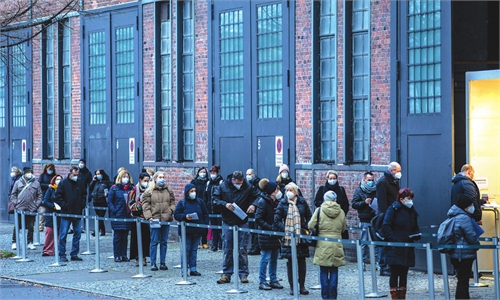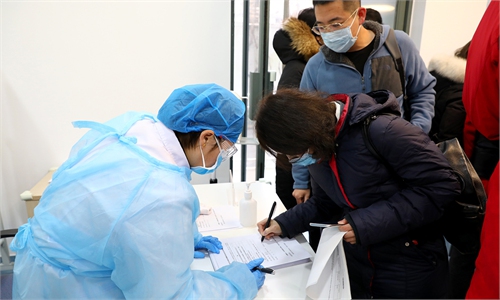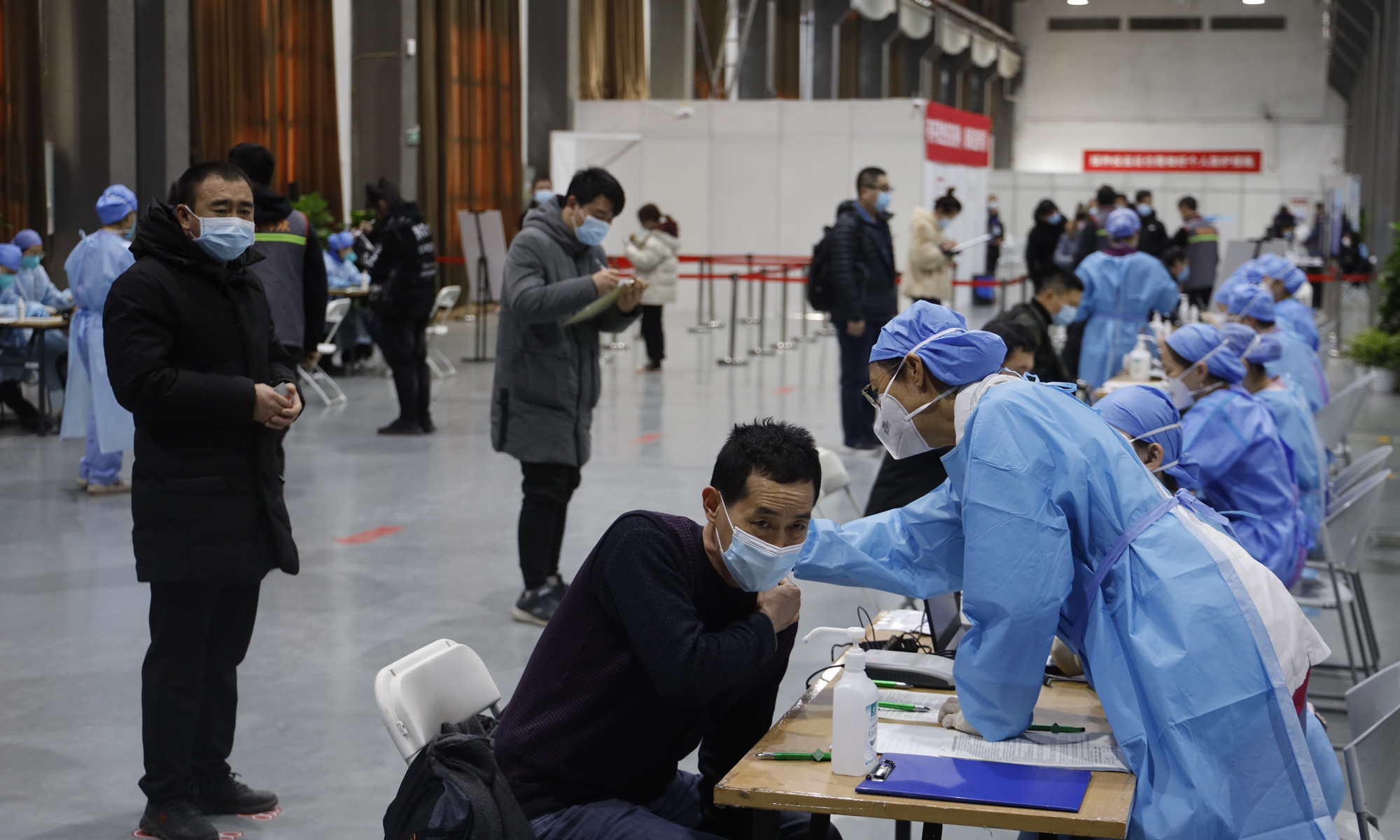
Medical workers check out people's health condition before vaccination at a temporary vaccination site in Chaoyang district, Beijing, on Monday. Photo: Li Hao/GT
With the COVID-19 vaccine being rolled out among high-risk groups in China, some foreigners living in the country covet for a dose to ensure they are not left out of the immunization plan. Chinese vaccines are seen as a lifesaver by many expats, especially those who are likely to return home once free flow across borders is restored.After consulting with disease control authorities and health systems in several provinces, Global Times reporters found that official vaccination registration for foreign residents is not available in most parts of China. But foreigners who fall in the category of priority groups in China are able to register for a dose through the organization they work for in some cities.
Experts say it is unlikely that the Chinese government will discriminate against foreigners in terms of vaccine availability, but stressed all procedures need to be completed as required by national policy and guidelines.
Securing a dose
Given the goal of vaccinating 50 million people ahead of the 2021 Spring Festival holidays, many cities including Beijing, Shanghai and Shenzhen in South China's Guangdong Province have already started mass inoculation, covering nine key groups of people including medical staff and workers in cold-chain, food and logistics sectors.
Health authorities in most of the first-tier cities reached by the Global Times including Guangzhou, Beijing and Shenzhen said they currently only arrange vaccination for key groups irrespective of nationality.
Foreign citizens who work in high-risk sectors such as cold-chain food or public transportation can be given priority for injection along with the Chinese staff, as long as their industry supervisory government department can make unified arrangement for them.
The Global Times has learned that Jiangnanfu, a restaurant in Beijing's Chaoyang district, registered its entire staff including foreigners at the end of December 2020 to receive the COVID-19 vaccine on a voluntary basis, under the instruction of Chaoyang district's food and drug authority.
The restaurant has more than 90 employees, including dozens of foreigners, who are waiting for further notification about specific vaccination details.
Beijing's Chaoyang district has rolled out mass vaccination for all people working in cold-chain and food industry since January 1.
Hannah Frishberg, an American national working in a university in Shanghai, received a dose produced by Chinese state-owned producer Sinopharm on a voluntary basis at a sports center vaccination site in Shanghai on Tuesday as part of group registration by her university.
Hannah said she has no serious side effect but only little fatigue and some bruising on the injection site after her initial dose.
She noted that all her foreign colleagues who have stayed in China for the past 14 days were given the option to receive the vaccine. She was asked to show her passport before the injection, and to link her passport number with the vaccine code for tracking safety. The cost was covered by the university for all those who volunteered to take the shot.
"I did not feel unsafe before taking the vaccine because I think China has done a great job with COVID-19 management and I did not travel internationally to avoid the risk of infection to myself and others. So I was not worried, but now I can say that I feel that my participation in receiving this vaccine will lead to the defeat of the virus hopefully," Hannah told the Global Times on Wednesday.
She suggested that she trusts Chinese vaccines' safety and effectiveness while still looking forward to seeing more data from the trials that go out for peer review.
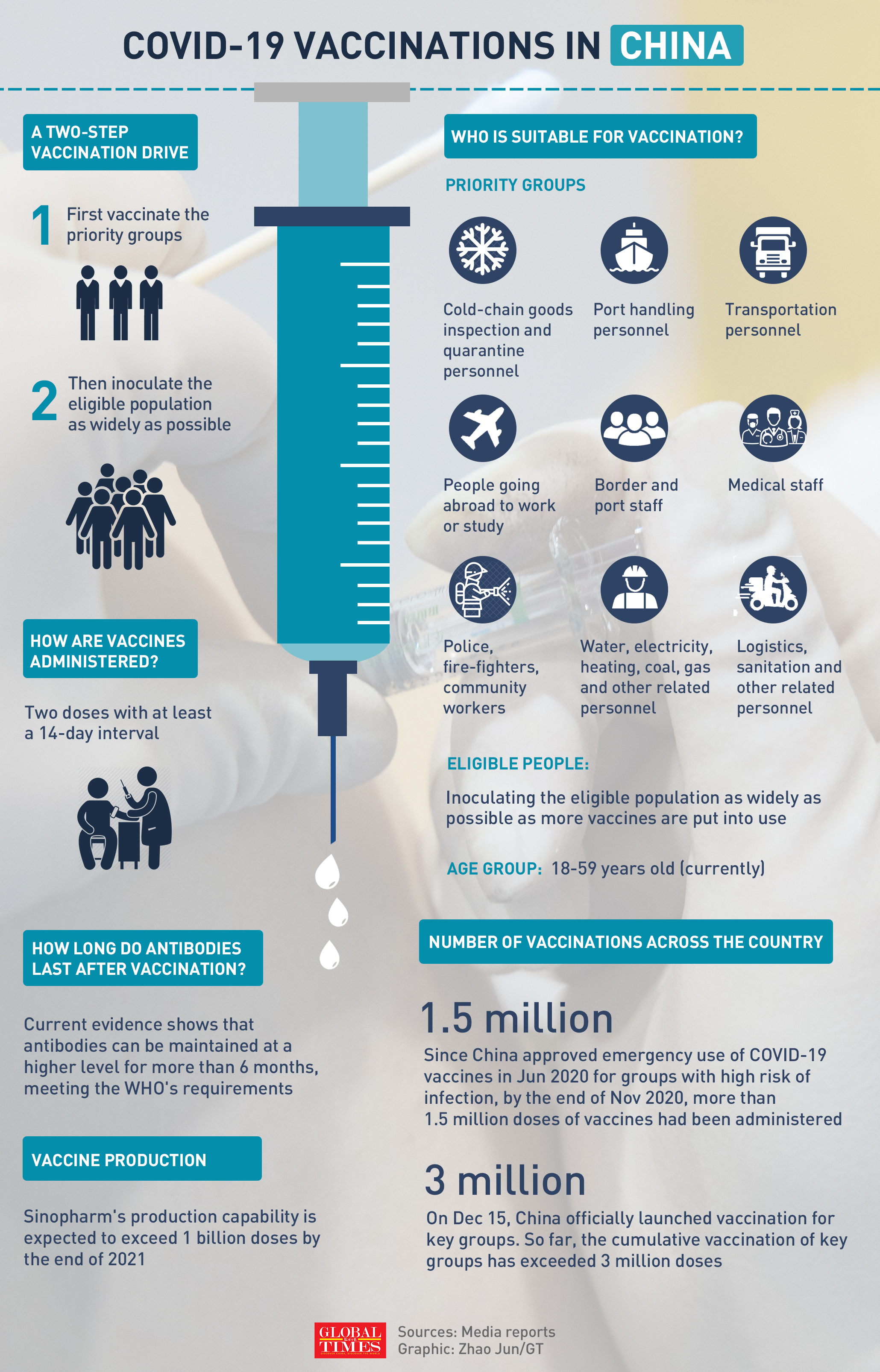
COVID-19 vaccinations in China. Graphic: GT
Trust in medicine, scienceCompared to some chaotic and disorderly vaccine distribution situations in some Western cities, Chinese cities have been rolling out large-scale vaccinations in an orderly fashion, and local medics in different places have finished the relevant training in order to respond to emergency situations.
While seriously criticizing some Western governments for their slow and messy approach to COVID-19 vaccinations, some Americans pin their hopes on Chinese vaccines.
Damon from the US told the Global Times that he prefers to get the Chinese-developed vaccine, even though he is living in Baltimore, for its higher safety compared with US giant Pfizer's vaccine, as he is worried some US "greedy pharmaceutical corporation may cut corners to make money."
"Chinese PLA scientists have experience in creating a vaccine for SARS, so they have more than proven their ability to combat deadly viruses; that and of course the Chinese government took the crisis seriously from the beginning, and actually invested manpower and resources into creating a vaccine on behalf of the people, a concept alien to most Western governments," he told the Global Times on Wednesday.
"US corporations and government put money ahead of their people, so what can stop them from doing it again with their vaccines?" Damon questioned.
Damon disdained the blind accusation against Chinese COVID-19 vaccines, calling it a "pure deflection of blame by the US government and media."
The US government botched its vaccine rollout, with many delayed shipments and unmet quotas, while China's has been comparatively smooth, Damon believes.
"Not only did our media underplay the severity of the pandemic in the first place and attacked China for enacting nationwide anti-virus procedures, it now is attacking China for creating a vaccine. I put my trust in medicine and science, not the delusions of Sinophobic journalists," he added.
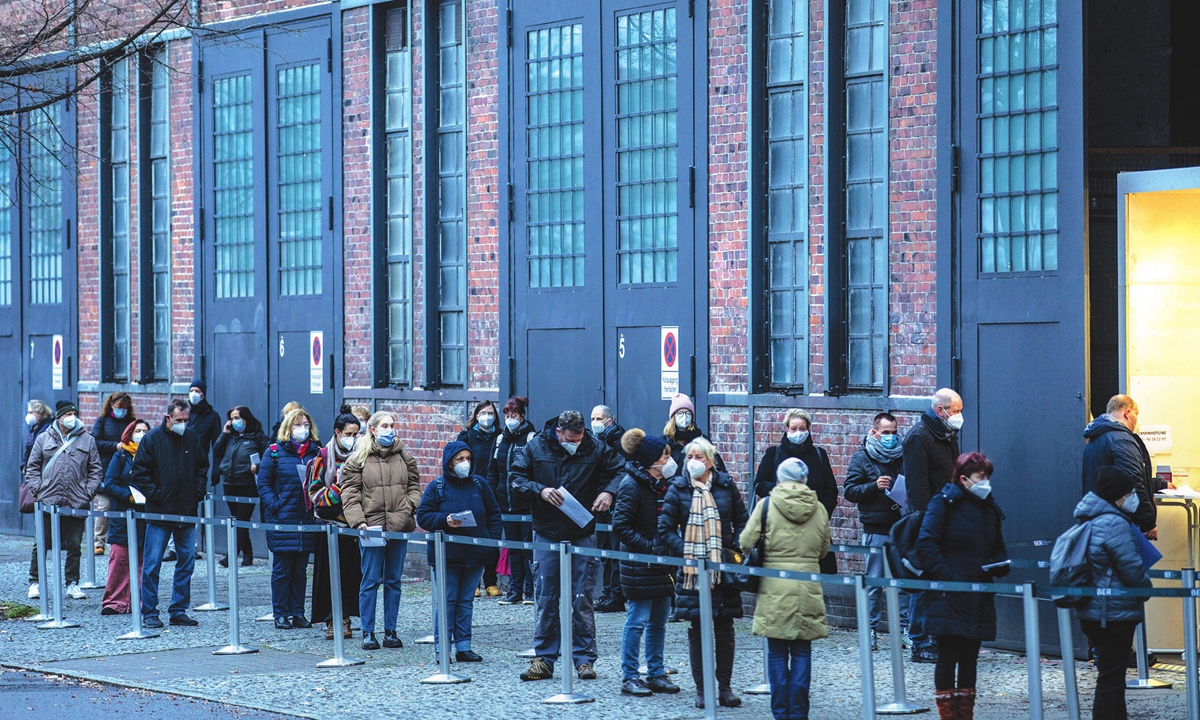
People wait in line to be vaccinated against COVID-19 in Berlin on Tuesday (local time). Germany plans to extend the interval of vaccination to vaccinate more people. Photo: VCG
Increasing enquiriesThe Guangzhou health authority told the Global Times that foreigners living in the city can apply for a dose with a valid ID (or the Chinese resident card of an immediate family member) at their own expense of 200 yuan per dose at a local vaccination site, if they have urgent need to travel abroad and present a proof of urgency.
Guangzhou is home to Asia's largest African migrant population, who come to China for business and study opportunities.
Unlike Guangzhou, community health service centers in some cities such as Chengdu, Southwest China's Sichuan Province, claimed that foreign citizens without Chinese green cards are temporarily unable to register for a COVID-19 vaccine.
Diplomats of some embassies in China including Pakistani and Indonesian embassies are not yet provided with the Chinese-produced vaccines as of press time.
Even though channels to access a Chinese vaccine are not yet clear, enthusiasm for Chinese vaccines among foreigners in China has not waned, and it has been a widely discussed topic across the social media platforms.
A staffer at a vaccination site in Beijing's Chaoyang district told the Global Times that they have been getting calls from an increasing number of foreign residents enquiring about their eligibility for a dose in recent days.
"It is a more urgent need for certain groups, for example, foreign students who have to graduate and go back to their countries," a foreigner living and working in Beijing, told the Global Times anonymously, suggesting that he may need one if he wants to travel outside in near future.
An American woman living in Shanghai who preferred not to be named told the Global Times that some organizations such as the American Chamber of Commerce in China are "trying to organize some vaccines for members and their families," while many have signed up to be on the list.
Who can apply?
Foreigners in the category of priority groups can register for vaccination in some cities.
Cities like Beijing, Guangzhou and Shenzhen are offering vaccines to key groups irrespective of nationality.
Nine key groups include workers in medical, cold-chain, food, and logistics sectors.
Foreigners' passport no. is registered with the vaccine code for tracking safety.
Guangzhou is allowing foreigners to apply for a dose with proof of urgency.
